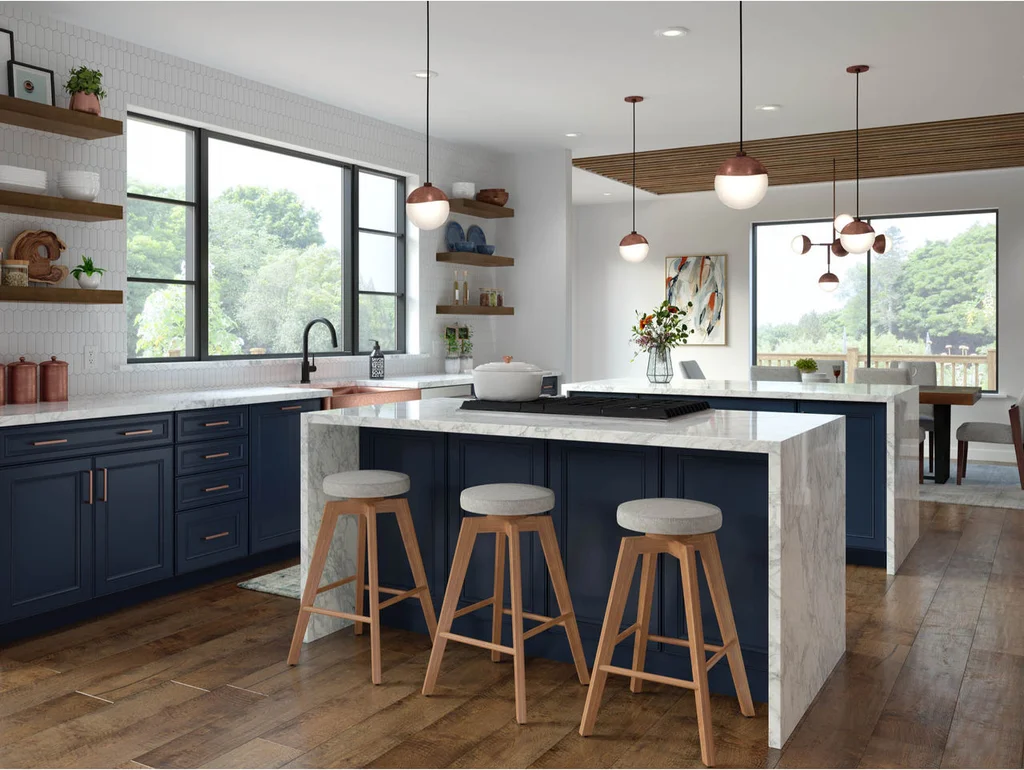When it comes to choosing a countertop for your kitchen, natural stone slabs like granite, marble, and quartzite are popular choices for their beauty, durability, and timeless appeal. Each type of stone has its unique characteristics, making it important to understand their pros and cons to determine the best fit for your kitchen. Let’s delve into the world of natural stone countertops to help you make an informed decision.
1. Granite
Pros:
- Durability: Granite is extremely hard and resistant to scratches and heat, making it ideal for busy kitchens.
- Unique Patterns: Each granite slab is unique, offering a variety of colors and patterns to choose from.
- Value: Adds a high-end look to kitchens and can increase home resale value.
Cons:
- Maintenance: Requires periodic sealing to prevent stains and maintain its appearance.
- Cost: Can be expensive, particularly for rare or exotic varieties.
- Weight: Heavy, necessitating sturdy cabinetry to support the weight.
2. Marble
Pros:
- Aesthetic Appeal: Marble offers a luxurious, classic look with its unique veining and elegant appearance.
- Cool Surface: Naturally cool, making it excellent for baking and pastry preparation.
Cons:
- Porosity: Highly porous, which makes it prone to staining and etching from acidic substances.
- Maintenance: Requires regular sealing and careful maintenance to prevent damage.
- Durability: Softer than granite and quartzite, making it more susceptible to scratches and chips.
3. Quartzite
Pros:
- Hardness: Quartzite is harder than granite, making it extremely durable and resistant to scratches and heat.
- Appearance: Often features beautiful, marble-like veining with the durability of granite.
- Low Maintenance: Less porous than marble, reducing the risk of stains and making it easier to maintain.
Cons:
- Cost: Generally more expensive than granite and marble.
- Sealing: While less porous, it still requires occasional sealing to maintain its look and prevent stains.
4. Soapstone
Pros:
- Stain Resistance: Non-porous and resistant to stains and bacteria.
- Heat Resistance: Can withstand high temperatures without damage.
- Soft, Matte Finish: Offers a smooth, rustic look that develops a patina over time.
Cons:
- Softness: Softer than other stones, making it more susceptible to scratches and dents.
- Limited Color Options: Typically comes in shades of grey and black, with limited variation.
5. Travertine
Pros:
- Aesthetic: Provides a warm, earthy look with its unique texture and natural patterns.
- Versatility: Available in various finishes, including polished, honed, and tumbled.
Cons:
- Porosity: Highly porous, requiring frequent sealing to prevent stains and etching.
- Durability: Softer and less durable than granite and quartzite, making it prone to scratches and chips.
Making the Right Choice
When selecting the best natural stone countertop for your kitchen, consider the following factors:
- Durability: If you need a countertop that can withstand heavy use, granite and quartzite are excellent choices.
- Aesthetic Appeal: For a luxurious and timeless look, marble is unmatched, but it requires more maintenance.
- Maintenance: If low maintenance is a priority, soapstone and certain types of quartzite offer durability with less upkeep.
- Budget: Natural stone countertops can vary widely in price. Granite typically offers a balance of beauty and cost, while exotic varieties and high-end stones like quartzite and marble can be more expensive.
Ultimately, the best natural stone countertop for your kitchen will depend on your specific needs and preferences. Consider your lifestyle, the overall design of your kitchen, and the level of maintenance you are willing to commit to. By understanding the unique properties of each type of natural stone, you can choose a countertop that not only enhances the beauty of your kitchen but also meets your practical needs.

